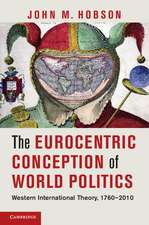War, Armed Force, and the People
Autor Walter C. Opelloen Limba Engleză Paperback – 18 oct 2016
Throughout history, innovations in military technology have transformed warfare, which, in turn, affected state formation. This interplay between warfare, military technology, and state formation is the focus of this text. Theoretically grounded in the bellicist approach to the study of war and state, which posits that war is a normal part of human experience, the book argues that the threat of war by powerful, predatory neighbors has been, until relatively recently, the prime mover of state formation. Using a historical approach, it explains how advances in military technology have transformed war, and how new modes of war in turn have transformed forms of politico-military rule, especially with regard to the relationship between the state, armed force, and the people.
Preț: 427.13 lei
Nou
81.73€ • 85.17$ • 67.67£
Carte tipărită la comandă
Livrare economică 03-17 aprilie
Specificații
ISBN-10: 1442268808
Pagini: 314
Dimensiuni: 152 x 229 x 27 mm
Greutate: 0.73 kg
Editura: Rowman & Littlefield
















